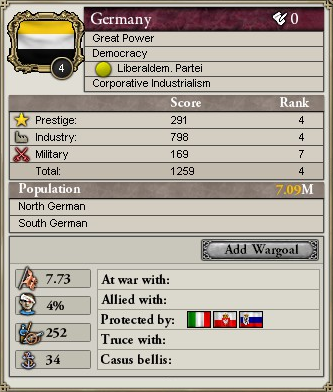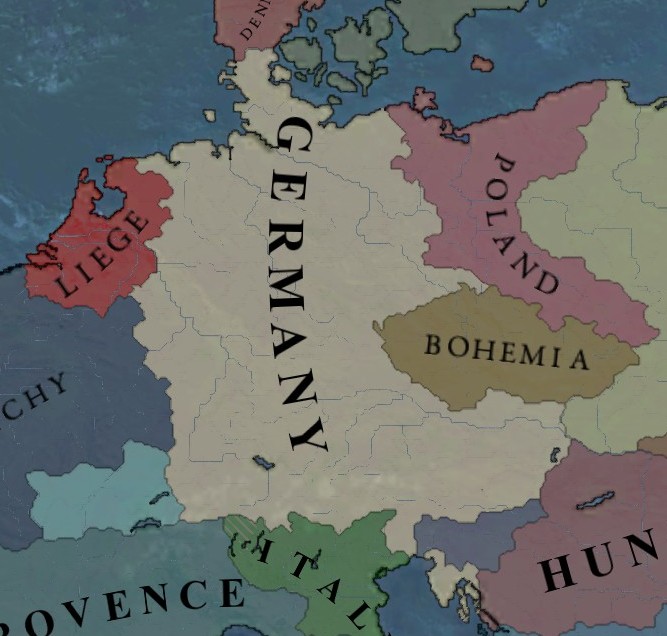Part 97: The Red Vizier
Chapter 17 - The Red Vizier - 1900 to 1904The dawn of the twentieth century is a crimson one, with a blood-red sun ascending on the first morning of the first year of the new century. A promise of things to come.
And already, wars are raging across the width of the globe. Starting in the vast continents of the West, the Kingdom of New England has finally challenged the Revolutionary Republic of Ibriz for their crown, with centuries of hostility and resentment culminating in vicious battles along the blood-drenched banks of the Mississippi.

Across the stormy waters of the Pacific, the two juggernauts of the East have also been struggling for dominance. Early into the new century, the Dictatorship of Japan launched a massive offensive towards Beijing whilst sea-borne soldiers burned and pillaged the coastline of the Empire of China, newly-reunited under the Guang dynasty.

Between the two ends of the earth, two of the few remaining African powers were embroiled in a conflict of their own, with the Kingdom of Benin declaring war on the faltering Sultanate of Morocco. Within mere months, the Almoravid army was in full retreat and Marrakesh was in sight, but the Berbers are tenacious and unwavering, and surrender was out of the question.

Guns have already been fired and blood has already been spilt, but the eyes of the Great Powers are focused somewhere else entirely: the ravaged lands of Germany, where war had only just erupted between brothers. Germany had descended into vicious conflicts before, of course, but it is quickly becoming obvious that this war is unlike any before it, with both sides drawing up harsh peace treaties and ironclad clauses, determined to cripple their bitter enemies once and for all.

And in between all these raging storms, Al Andalus perches aloft, enjoying the boons of her splendid isolation. “Peace, Prosperity and Plentifulness” was a phrase associated with the Reformed Socialist Faction, but this saying was little more than a farce, as anger and tensions continued to bubble amongst the masses, occasionally erupting into violent clashes and rioting.


It is in this precarious climate that, for the first time in decades, the gulf between the people and the leadership of Al Andalus begins to diverge. Whilst the aristocrats and viziers continue to play their political games in the Majlis al-Shura, the commoners turn up in huge numbers to register their votes in the elected-but-powerless lower house, where the liberals dominate the socialists and moderates in a sweeping landslide.

As expected, however, this isn’t reflected in the upper house. Instead, the Reformed Socialists have refused to surrender their grip on power, with the so-called “reds” led by Grand Vizier Rajul Majnun Mujamad - a veteran soldier who rapidly rose through the ranks of government through a combination of averse diplomacy and highly-coincidental deaths. He was, as his critics and detractors liked to call him, the Red Vizier.


Most importantly, however, the Red Vizier had risen to power on the backs of demonstrators and agitators, buoyed to his esteemed position through constant protests and rallies and strikes in the factories and workhouses of Majrit, Lishbuna, Burghus, Liyun, Shant Yakub.
According to recent elections, however, he had finally lost the mandate of the people, and that meant his power base was beginning to crumble. So without delay, the Grand Vizier announced a series of ambitious construction projects, vowing to renew and overhaul the infrastructure of Al Andalus - with a particular focus on northern Iberia, where the socialists drew most of their support.


And his promises didn’t end there, with Grand Vizier Rajul also determined to implement a series of long-awaited and much-anticipated social reforms. Al Andalus was positively primitive in that regard, compared to the extensive reforms implemented by other European nations, and previous governments (most notably the liberals) had constantly promised to do the same.
Needless to say, these promises had not been honoured. Rajul was no liberal, however, and he was determined to shift the odds back in his favour. He began with the raising of the minimum wage, hoping to earn back the support of the breadwinners of Iberia - working men, the only stratum that could actually vote.


As the duelling between Andalusi politicians begins to intensify, the Moroccans launched a devastating counter-attack against Beninese forces in the barren deserts and rugged mountains of West Africa, with the barrage of gunfire and shrapnel culminating in the decisive battle of Taoudenni.
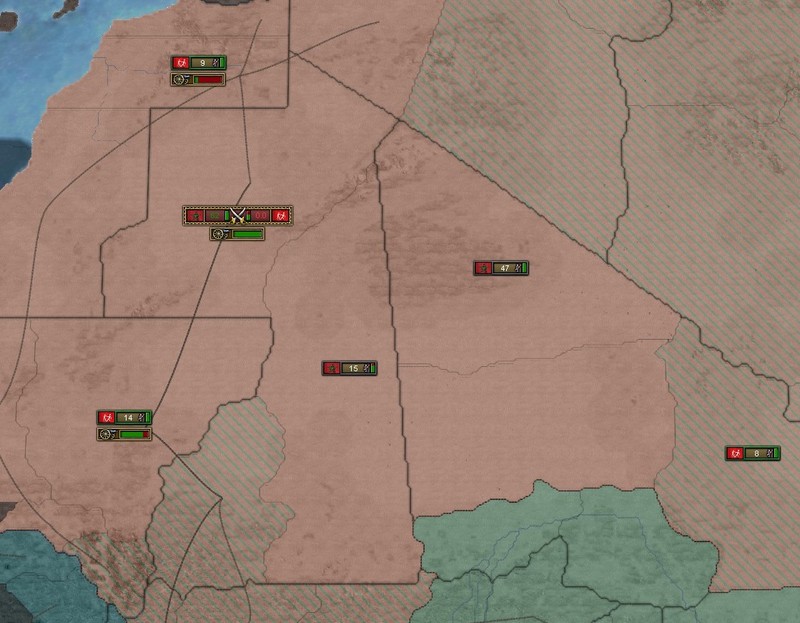
A crossroads between a dozen desert roads and trade routes, the once-prosperous mining town of Taoudenni was bathed in blood over the next few days, with tens of thousands of Berbers and Beninese gunned down in the narrow streets, blown apart in stinking hovels, crushed in steep trenches and annihilated in lightning offensives.
When the morning sun rose above Taoudenni, however, it was the Almoravid flag that was fluttering in the wind.
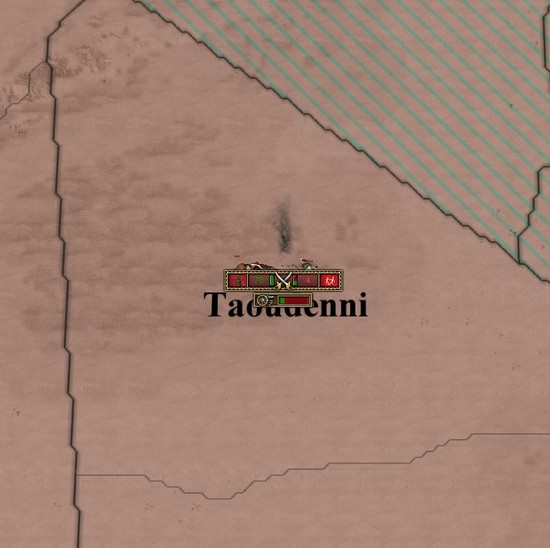
With hundreds of thousands of Berbers suddenly flooding southward, burning and raping and killing without distinction, the balance of the war suddenly shifted against Benin. Just two months later, the entirety of Ghana was under enemy occupation, quickly followed by large stretches of Togo and Ivory Coast over the next few weeks.
The Beninese were forced to employ guerrilla tactics to delay the Berber advance, but just half a year later, Benin City itself came under threat. As the Berbers swivelled their artillery to begin shelling the capital of Benin, the pagans were finally forced to the negotiating tables, where they would have to pay a pretty price for peace.

Morocco, it would seem, was back on the rise.
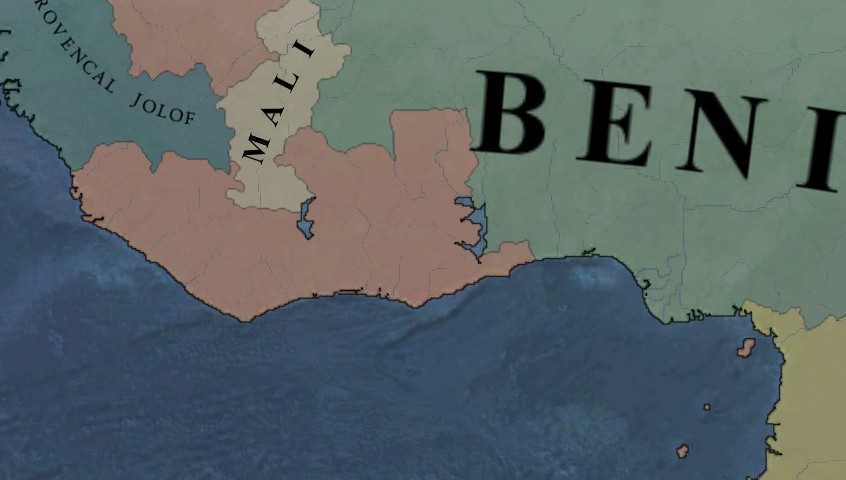
To the Far East, another war had also come to an end, though this time on slightly more even terms. China and Japan had clashed for the better part of two years, and despite seizing Beijing and Mongolia in the early months of the war, the Japanese advance was quickly brought to a firm halt by Chinese troops.
The fighting devolved into trench warfare, and after trying and failing to break the stalemate for another year, diplomats were exchanged and peace talks begun. After several long weeks of negotiation, the Guang Emperor agreed to cede Beijing - ravaged and depopulated as it was - in return for a guarantee of peace. And that promise of peace was eventually signed and declared, but both Japan and China immediately went back to their drawing boards, determined to emerge as the uncontested victor in their inevitable next clash.

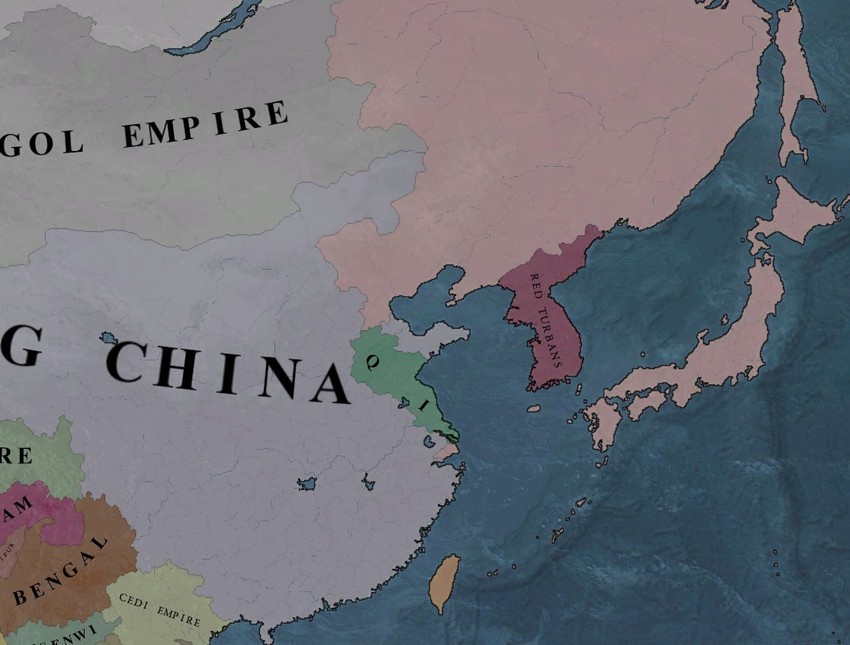
As one war ends, however, another is sure to begin elsewhere. This time, tensions were mounting in the Balkan Peninsula, where communists had seized power in Serbia through violent revolution.
Determined to contain this communist crisis before it could spread much further, the Great Powers of Europe discussed the possibility of dispatching a joint expeditionary force to topple the communists and restore monarchism in Serbia. Al Andalus was invited, of course, but Grand Vizier Rajul immediately refused - Al Andalus was firmly isolationist, and would not waste money and lives on some foolish Balkan adventure.

The Grand Vizier did offer to mediate peace talks between Serbia and the Great Powers, however. He hoped to avoid the escalation of the crisis into yet another continent-spanning war, but the Great Powers refused to even recognise the communist government of Serbia, much less enter diplomatic talks with them.
And sure as rain, the Balkans erupted into conflict late in the year, with Bulgaria and Greece declaring war on Serbia, backed by foreign money, arms and expeditionary forces.
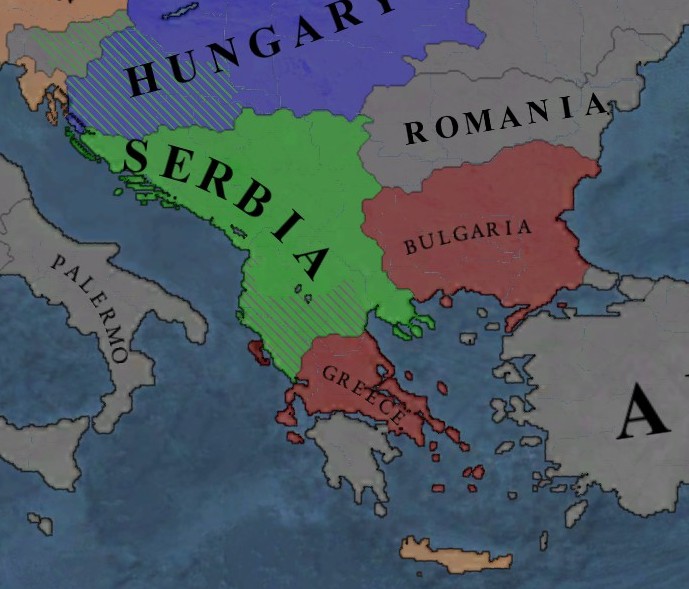
Nevertheless, for his efforts to maintain the peace, Rajul Mujamad was awarded the distinguished Global Peace Prize in 1902. He travelled to Rome to accept the prize, very conscious of his growing popularity at home.
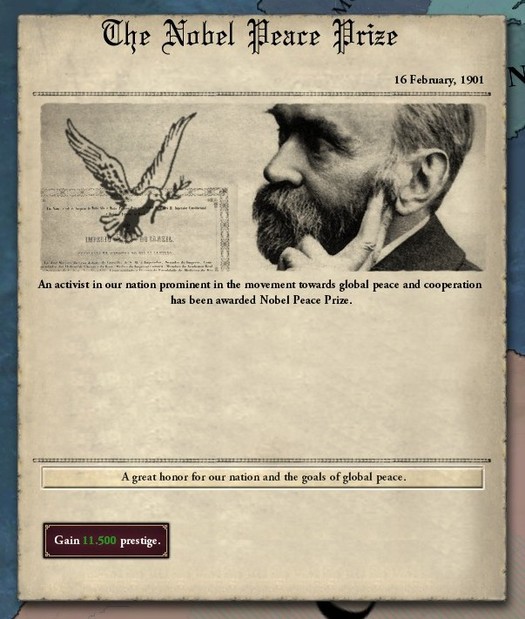
In fact, a number of Andalusi would rise to global prominence over the next few years, winning prestigious prizes in medicine, physiology, chemistry and physics, amongst other scientific fields and avenues. Ever the politician, the Grand Vizier immediately twisted their achievements to his benefit, insisting that these cultural milestones were proof that peace worked, that splendid isolation worked, that socialism worked. Peace, prosperity and plentifulness for all.
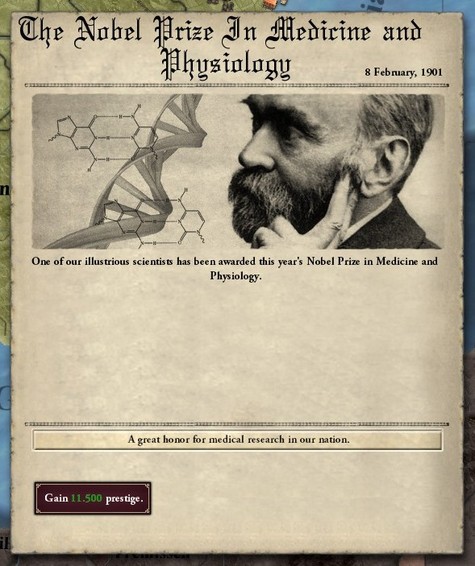

And despite increasing estrangement with fringe groups, Grand Vizier Rajul gradually won the support of the Castilians and Portuguese, giving him enough leverage in the Majlis to push another series of reforms from his papers and into daylight.
First was the implementation of modern state-funded school systems in León, Asturias and Castille, with these northern regions sorely lagging behind Portugal and southern Andalusia in that regard.
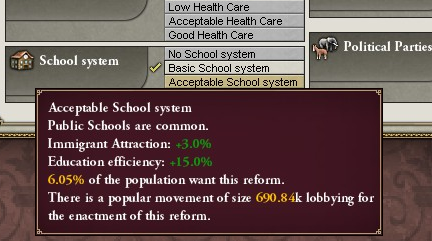

Second, just a few months later, Rajul managed lay down the foundations of a national healthcare system through a series of laws that established sickness insurance, free public hospitals and free primary care throughout the country.
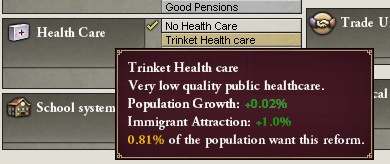

And finally, just as the summer of 1903 began to break, the Grand Vizier announced the completion of one of his promised campaign goals: the construction of the Pyrenaic Wall, a series of austere fortifications and weapons installations that stretched along the length of the Pyrenees, from Navarre to Narbuna.
If the enemy was foolish enough to invade Iberia again, this was where they would be stopped, this was where they would be broken.
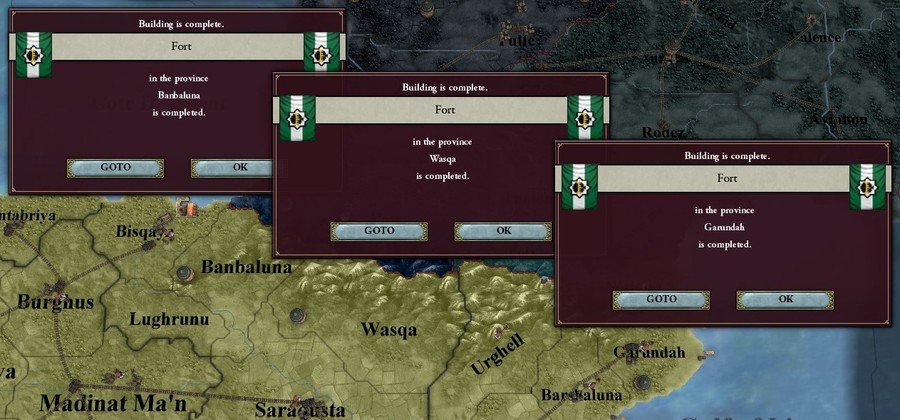
With all this taken into account, it isn’t much of a surprise to find that socialist support was surging in northern Iberia. This vizier - the Red Vizier - was the first Andalusi leader to actually care about the poor and disenfranchised of the north, and they loved him for it. All of his audacious reforms and expensive constructions also meant that the Red Vizier had made enemies, however, enemies that were waiting for even the slightest stutter before they pounced.
And that stutter finally arrived in the dying months of 1903.
It began in Mataka, a coastal fortress garrisoned by African troops and led by Andalusi commanders, but surrounded on all sides by the “Khedivate of the Kongo”. In November of 1903, however, these colonial troops mutinied and killed their commander, before defecting to the Khedivate.
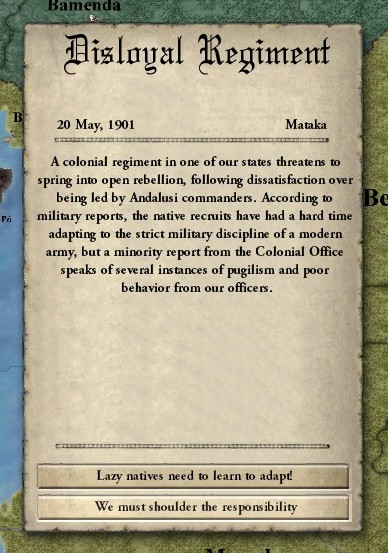
The Andalusi Army had been declining for decades now, but mutiny was a step too far and demanded retribution. A few politicians called for an immediate investigation, whilst a sizeable number of nobles instead demanded that these mutineers be court-martialled, and some of the more extreme aristocrats even claiming that this was all orchestrated by the Khedive, and it was him who should be brought to heel.
Grand Vizier Rajul listened, and nodded, and did nothing.
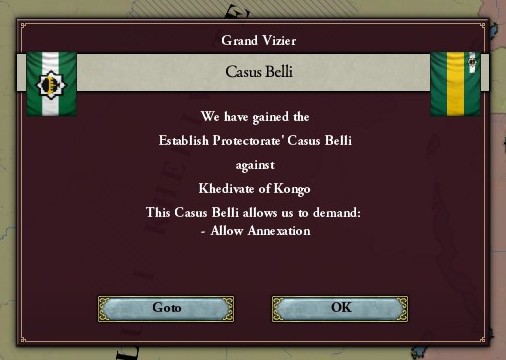
To many in the colonies, this was just the proof that they had been waiting for, proof that Al Andalus had grown fat, corrupt and weak. If they were ever going to seize their independence, then now was the time.
And slowly but surely, these agitators began to meet in broad daylight, openly talking of rebellious insurrection. Conferences were organised, conventions were conducted, talks were held and demonstrations were staged and clashes became commonplace. Within months, all semblance of order in the colonies began to collapse.
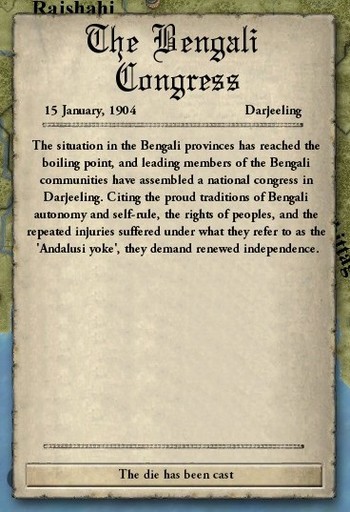
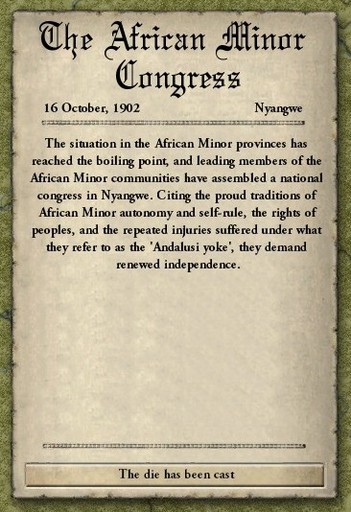
It began as a few isolated incidents, where a lone gunman or secluded nationalist tried to storm a government outpost, only to be apprehended, chained and brought into custody without too much of a fuss. But then that lone gunman became a small party of agitators, that small party became a crowd of unruly insurgents, and that crowd eventually became an army of firebrands and and incendiaries, rebels and revolutionaries. The Great Indian Uprising had begun.
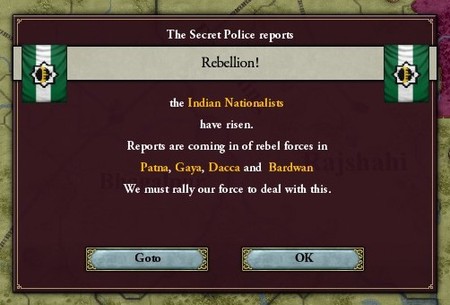
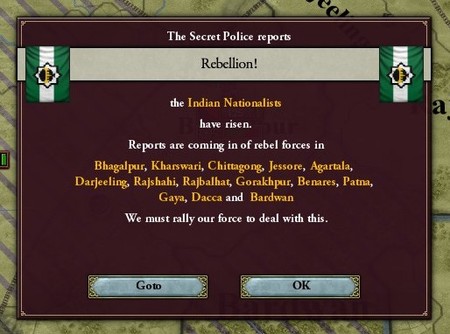

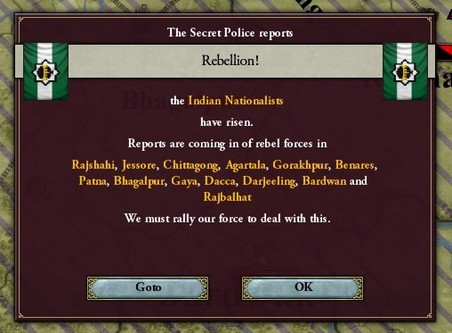
Needless to say, the Red Vizier came under heavy criticism in Qadis, with newspapers and politicians alike lambasting him for his naivety and foolhardiness, with some even denouncing him as a French mole or Berber spy.
With his position suddenly untenable, Grand Vizier Rajul quickly retraced his steps, announcing the departure of a large expeditionary force to quash the Indian Uprising. But this was one mistake he would never recover from, and as rioting and upheaval swept across southern Iberia, the Red Vizier was fatally stabbed at a public banquet. The perpetrator - an anarchist clad entirely in black - was quickly apprehended, but he would commit suicide in his cell just hours later, to be joined in death by Rajul Majnun Mujamad.
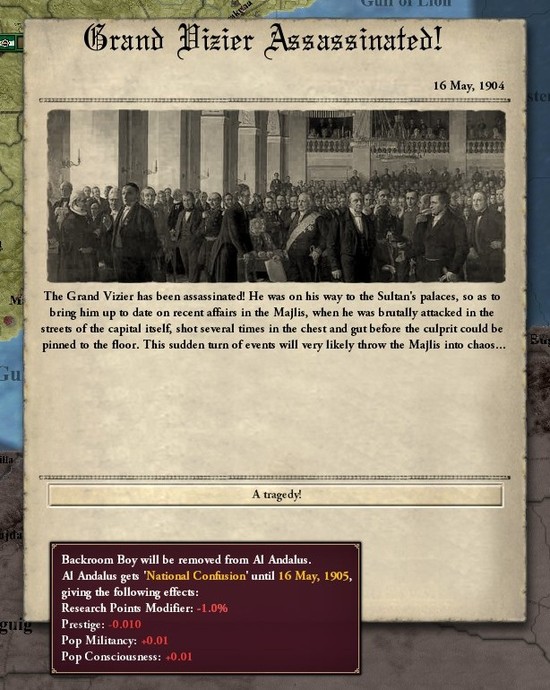
And it was only now, with the Red Vizier murdered and his followers thrust into chaos, that his opposition finally played their hand.
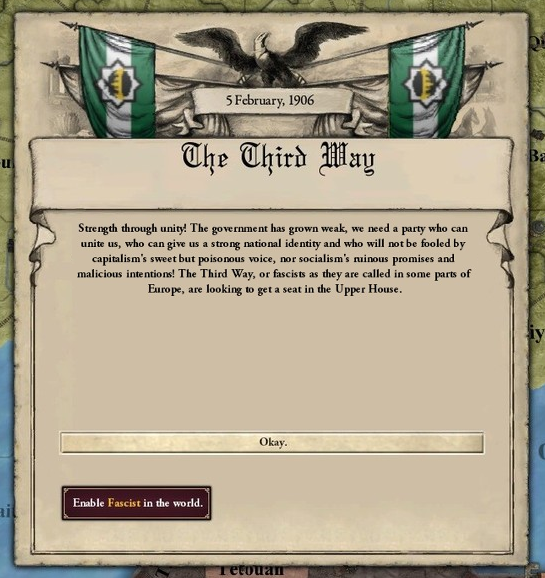
It was generally assumed that Sultan Khuzaymah Zulfiqar spent his days isolated and withdrawn, sulking about his palaces and drowning himself in opium after his brief and catastrophic foray into politics.
As it turned out, however, nothing could be further from the truth. He still smoked copious amounts of opium, of course, but he had also been working with his strongest supporters - both in the SGA and the Royalists - to counter the moves of the Red Vizier from the shadows. And just days after his prime minister was murdered, the Sultan proudly announced the formation of a new party in the Majlis - the Supreme Sultanic Faction, dedicated to upholding Muslim traditions and Andalusi supremacy under the leadership of a single, all-powerful autocrat.
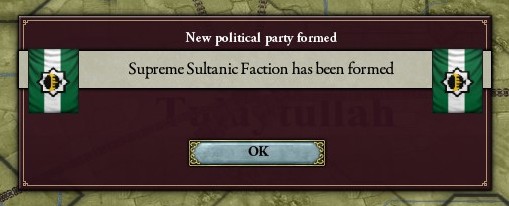
The Royalists had become increasingly irrelevant amongst the masses, and this was the Sultan’s way of rejuvenating his support - making his cause the cause of all Andalusi, both noble and common, rich and poor, great and small.
And it wasn’t very long before this new breed of fascism began gaining traction, with a number of notable ministers (likely SGA agents) immediately declaring their support for the new faction, and delivering animated speeches that attracted the attentions and support of hundreds of thousands of Andalusi in southern Iberia, which was already opposed to the red government.
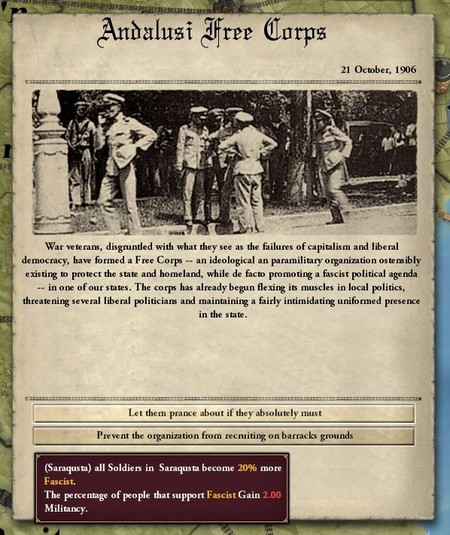
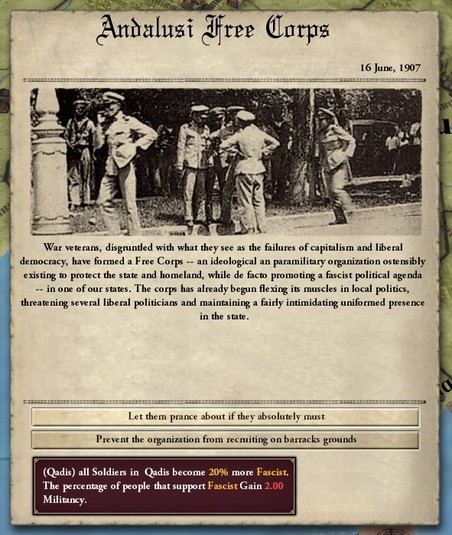
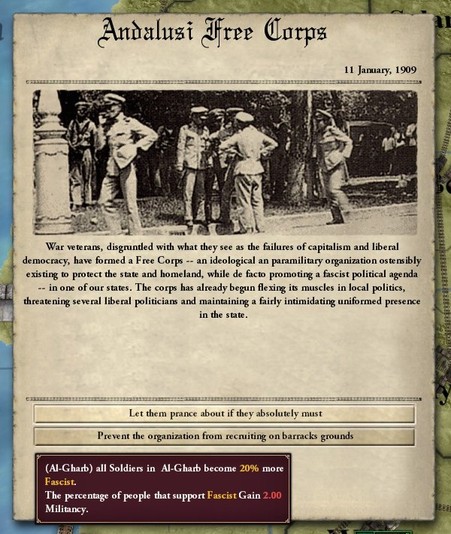
A new era is beginning in Iberia, that much is obvious even to the blind, and the same can be said for the long-lost son of Al Andalus — Ibriz.
After a ruinous war that stretched across five bloody years, the Revolutionary Republic of Ibriz and Kingdom of New England finally agreed to terms for peace - a peace that would reverberate and echo in the decades to follow. Ibriz was forced to surrender all their possessions east of the Mississippi, giving New England their long-sought border along the banks of the great river, a border that was well-fortified and highly-defensible.
More importantly, this victory also transformed New England into the dominating power of Gharbia, a notion that would’ve been inconceivable just a century past. And as the winds begin to shift against them, riots and brawls erupted all across Ibriz, with talk of revolution in the air once again.
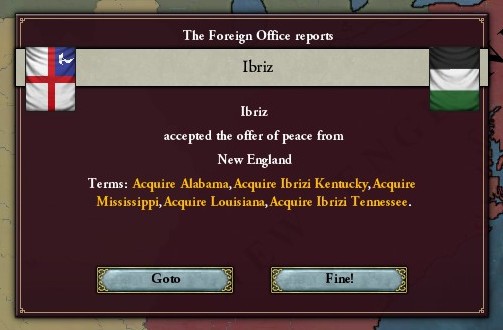
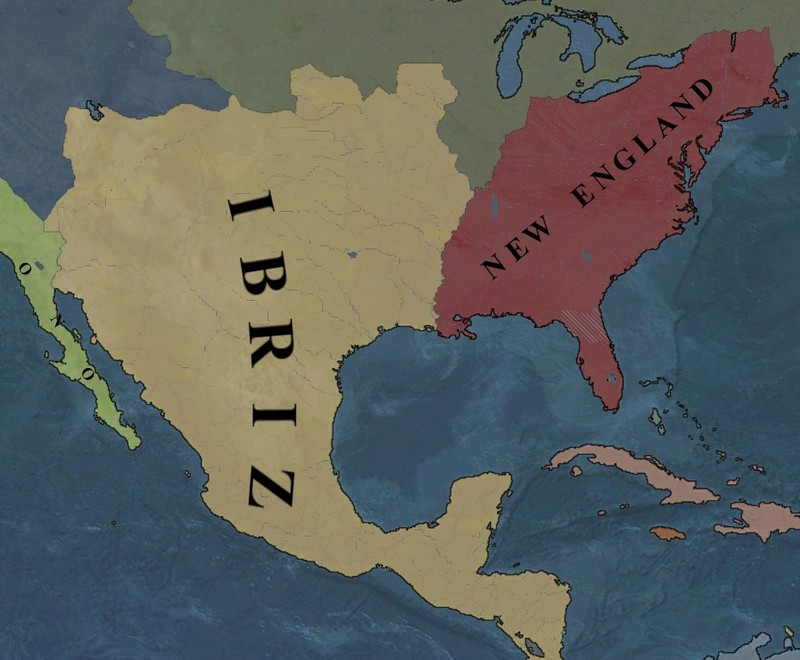
And just days later, the war in Europe also comes to an end, with a devastating Northern offensive shattering Southern lines and paving the road to München. Just two weeks later, North German troops were pouring into the capital after a bloodless siege, with the enemy leadership long-fled into hiding and exile.
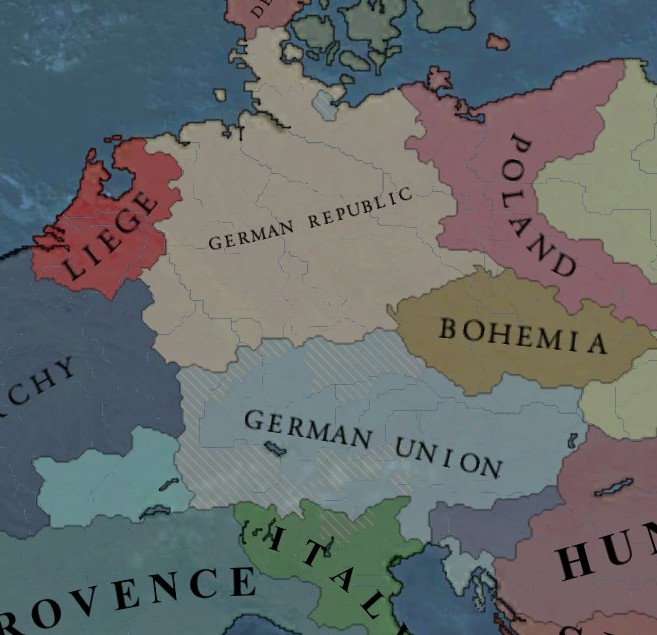
If the terms for peace between Ibriz and New England were harsh, then the terms enforced by the North German Republic were positively Carthaginian, with the South German Union defeated, dismantled and dissolved, only to be completely absorbed into the Republic.
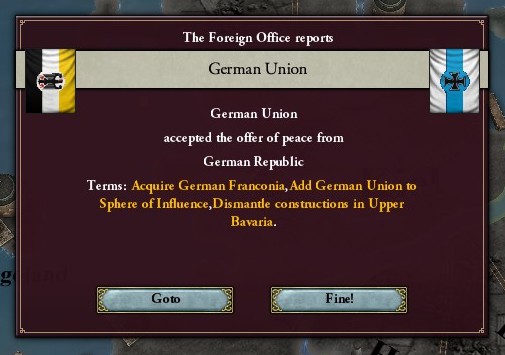
Scarcely a month after the fall of München, the Chancellor of North Germany formally proclaimed the disbandment of North Germany and South Germany, and the dawn of the Republic of Germany, a confederation of scattered principalities and disparate duchies and rivalled cities that once made up the ravaged lands of Central Europe, eternally united under the ideals of liberalism and democracy.
This is what France and Russia had been so desperate to prevent. This was the ultimate ambition of dozens of kings and revolutionaries, from Grim Torgeir to August-Wilhelm. This is what countless Germans had fought and died for, only for their dreams to be foiled time and time again. No longer.
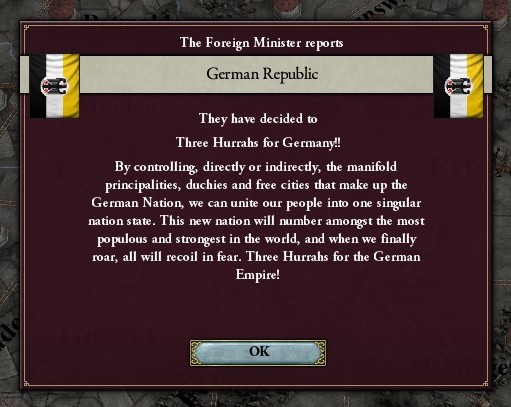
For the first time in a millennium, Germany is united, and the world will never be the same again.
